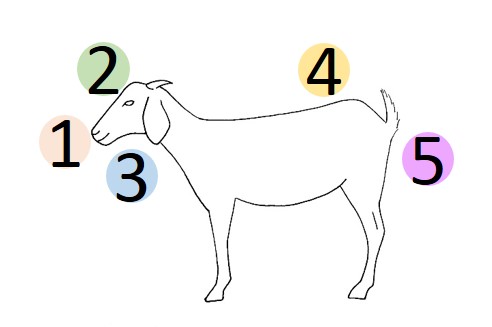Improving sheep and goat health: community-led monitoring and targeted treatment
Monitoring the health of whole herds and targeting treatment at individual animals that need it most can effectively improve animal health and productivity while minimising cost. This research looked at a community-led framework for gutworm treatment for goats and sheep in northern Botswana.
About the research
Internal parasites such as gutworms (roundworms) and fluke (flatworms) affect the health of livestock, reduce milk production, growth rate and fertility, and increase susceptibility to other diseases. In South-East Asia and sub-Saharan Africa, worm infection is ranked as the animal health constraint with the highest impact on resource-poor livestock keepers.
In regions where livestock such as goats and sheep are primarily kept for subsistence the high cost of veterinary medicines and resource constraints often make treating the whole herd or flock unfeasible and unsustainable. This is also unnecessary as most of the parasites are in a few individual animals, and only those need to be treated.
Monitoring the whole herd or flock at regular intervals and targeting treatment to only the individual sheep and goats that need it most can effectively improve animal health and productivity while minimising the investment required from the farmer.
Research conducted at the University of Bristol in collaboration with Elephants for Africa and the University of Pretoria has further demonstrated the feasibility and sustainability of a community-led framework for targeted treatment of goats.
Image by Marina Tavolaro
Policy implications
- Significant improvements in sheep and goat health can be made by regular monitoring and targeted treatment of individuals most in need.
- Training is all inclusive: there are no barriers such as prerequisite literacy skills or previous animal health experience.
- Veterinary officials and community leaders can help drive the success of targeted treatment programmes by supporting and training farmers, and providing access to veterinary medicines.
- An accredited training programme should be established to train veterinary officials and other potential community leaders in the 5 Point Check©.
- Farmers receiving sheep or goats as part of capacity building or poverty alleviation initiatives should receive 5 Point Check© training.
- Veterinary pharmaceutical distributors such as Livestock Advisory Centres and veterinarians should be made aware of the method and benefits of targeted individual treatment.
- The potential to extend targeted treatment to cattle should be explored.
The role of community leaders
Veterinary officials In most cases the community leader will be a Veterinary Extension Officer (VEO), Agricultural Extension Officer, inoculator or animal health officer (the precise title of the position varies by region).
Local individuals
In the absence of a VEO or similar official, the role of community leader can be transferred to a nominated local individual as there are no prerequisites for training – for example a background in animal health or literacy is not required. A similar framework has been successful in some regions for the administration of human health programmes.
Benefits of community-led targeted treatment against gutworms
- Improved goat and sheep health and productivity including better growth, higher kid/lamb survival rate, and higher milk production.
- Improved rural nutritional and income status.
- Resilience to extreme weather events and other disease outbreaks.
- Heightened awareness of animal health and improved monitoring.
- Hands on education opportunities not limited by literacy or previous animal health experience.
Benefits of community leaders
- Trained community leaders play a central role in the success of targeted treatment programmes Education and local knowledge capacity
- Farmers can receive ongoing training in the targeted individual treatment method beyond the initiation of a programme.
- Regular contact with trainers and retraining would also improve uptake of the programme. Disease monitoring and surveillance
- Farmers become accustomed to regularly handling and monitoring their animals for signs of ill-health.
- Veterinary officials can collect farmer records, feeding the information back to the government disease surveillance networks. Access to veterinary medicines
- The cost of treatment may be prohibitive due to large pack sizes, and distance from stockists. Local veterinary officials are wellplaced to source and supply individual, affordable doses locally.
Five Point Check© (5·√©)
The 5 Point Check© is a practical, farmer-friendly guide that is used to evaluate goats and sheep rapidly for signs of parasites, allowing farmers and veterinary officials to determine which individuals are in need of treatment.

- Check for nasal discharge (indicator of nasal bot fly larvae)
- Assess anaemia using the FAMACHA© scoring system (indicator of blood-feeding parasites such as Barber’s pole worm and liver fluke)
- Check for swollen jaw (indicator of blood-feeding parasites such as Barber’s pole worm and liver fluke)
- Assess body condition (loss of condition due to parasitic infection and loss of appetite)
- Assess soiling level (diarrhoea is an indicator of some gutworm infections)
Image by Dr Hannah Rose
Further information
Walker, J. G. et al., 2015. Mixed methods evaluation of targeted selective anthelmintic treatment by resource-poor smallholder goat farmers in Botswana. Veterinary Parasitology, 214, 80-88. DOI: http://dx.doi.org/10.1016/j.vetpar.2015.10.006
G.F. Bath, J.A. van Wyk, 2009. The Five Point Check (for targeted selective treatment of internal parasites in small ruminants. Small Ruminant Research, 86, pp. 6–13. DOI: http://dx.doi.org/10.1016/j.smallrumres.2009.09.009
Acknowledgements
Approval for the original research was obtained from the Government of Botswana through the Ministry of Environment, Wildlife and Tourism and the Ministry of Agriculture, permit reference EWT 8/36/4 XXI (44). The study was funded by the Cabot Institute of the University of Bristol, the UK Biotechnology and Biological Sciences Research Council (BBSRC) (project BB/H00940X/1 RISCNET), EU FP7 GLOWORM project (grant no. 288975CP-TP-KBBE.2011.1.3-04) and a University of Bristol Postgraduate Research Scholarship.
Authors
Dr Eric Morgan, Dr Josephine Walker, Dr Hannah Rose, Katie Bull (University of Bristol), Dr Jan van Wyk (University of Pretoria), Dr Kate Evans (Elephants for Africa, Botswana)
